Sustaining Our Cities
May 28, 2014
By Allie Nicodemo
Imagine a typical day in your city – the commute to work, walk around the block on your lunch break, trip to the dog park before meeting up with friends at a local restaurant. Now imagine what daily life in your city might be like if twice as many people called it home.
This thought experiment isn’t too far from becoming reality. The world population keeps growing with no signs of slowing down. The Census Bureau projects that today’s 7.1 billion will become 9 billion by 2044, and increasingly, these people are moving into cities. The World Health Organization predicts that by 2050, 6.4 billion people around the globe will live in urban areas - up from 3.4 billion in 2009.
Most of this growth is taking place in developing countries. However, certain cities in the U.S. are experiencing significant population increases as well. Phoenix is one of them, having added more than 40,000 new residents last year alone.
A substantial increase in population, coupled with hotter temperatures and other manifestations of climate change, will present unprecedented challenges for cities. Not only is Phoenix growing rapidly, but its climate also mirrors that of many other cities with populations on the rise, providing a good example of what much of the world is facing now or can expect in the future.
"Phoenix is a place that a lot of people look to for an example of how we will be resilient in the face of what are probably less than optimal conditions," says Wellington Reiter, a consultant for the Office of the President and former dean of the former College of Design at Arizona State University. "What we learn here and how efficiently we use our resources could be exported as intellectual capital or maybe even on-the-ground know-how."
Defining sustainability
The challenges of population growth, climate change and other changing conditions are leading many cities to explore sustainability options. But what does sustainability mean, and how do we measure it?
"It’s defined in many different ways," says David Pijawka, a professor and associate director of ASU’s School of Geographical Sciences and Urban Planning. These varying definitions have made it difficult for cities to make policy changes that would help mitigate future challenges.
"We’ve been dealing with that for 25 years. We have some good frameworks and we know what we need to do, but we still must learn to articulate it meaningfully and easily for the decision maker," says Pijawka, who is also a Senior Sustainability Scientist in the Julie Ann Wrigley Global Institute of Sustainability.
In 1987, the United Nations World Commission on Environment and Development defined sustainable development as "development that meets the needs of the present without compromising the ability of future generations to meet their own needs." Many people equate sustainability with environmentalism, but sustainability researchers at ASU are working to broaden our understanding of the concept. They define sustainability as well-being in four key areas: natural capital (plants, animals, water, etc.) human capital (skills, knowledge, etc.), social capital (networks of relationships) and financial capital.
Sustainability is complex because these different sources of capital often conflict with each other. For example, logging a forest reduces natural capital, but can provide jobs that increase financial capital. Different people will prioritize these tradeoffs differently. Someone living in poverty in a rural area might prioritize jobs over environmentalism, while a well-employed person with asthma might place more value on clean air.
"If we want people to continue living here, we have to make certain choices," says Anne Reichman, program manager of the Sustainable Cities Network at ASU. "Those choices are going to be difficult in the future when we look at the cost of water, the cost of energy, our air quality, and resource availability."
These are just some of the factors that must be considered when planning for sustainability. And they’re all connected.
See more at ASU's Office of Knowledge and Enterprise Development


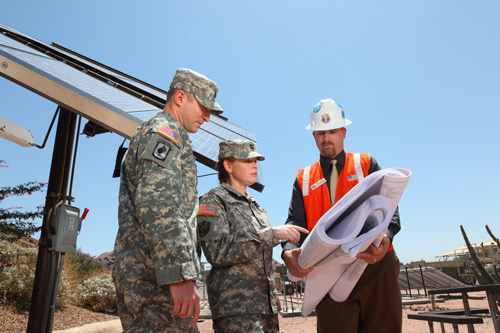 WASHINGTON, DC — November 4, 2013 — On Tuesday, November 5th, just days before Veterans Day, the White House will honor 12 local heroes as "Champions of Change." The event will celebrate American veterans of Iraq and Afghanistan who are doing extraordinary work to advance clean energy and increase climate resilience and preparedness in their communities.
WASHINGTON, DC — November 4, 2013 — On Tuesday, November 5th, just days before Veterans Day, the White House will honor 12 local heroes as "Champions of Change." The event will celebrate American veterans of Iraq and Afghanistan who are doing extraordinary work to advance clean energy and increase climate resilience and preparedness in their communities.
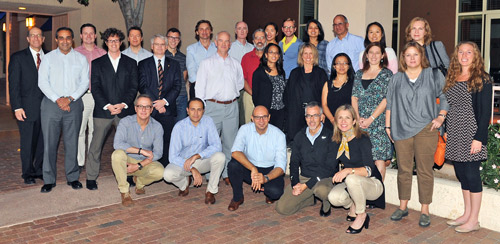 TEMPE, Ariz. — October 22, 2013 — Tasked with determining how best to invest global money in developing countries, the International Finance Corporation (IFC) consulted Arizona State University (ASU) for expert sustainability advice, October 15-16 at ASU.
TEMPE, Ariz. — October 22, 2013 — Tasked with determining how best to invest global money in developing countries, the International Finance Corporation (IFC) consulted Arizona State University (ASU) for expert sustainability advice, October 15-16 at ASU.
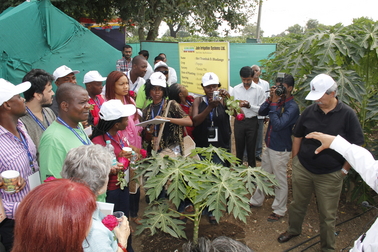 TEMPE, Ariz. — October 15, 2013 — The annual Empowerment for Peace through Leadership in Agribusiness and Sustainability (EmPeace LABS) conference takes place October 19-26 in Maharashtra, India to connect global farmers in a network that will further sustainable farming methods and establish peaceful communities in developing countries.
TEMPE, Ariz. — October 15, 2013 — The annual Empowerment for Peace through Leadership in Agribusiness and Sustainability (EmPeace LABS) conference takes place October 19-26 in Maharashtra, India to connect global farmers in a network that will further sustainable farming methods and establish peaceful communities in developing countries.

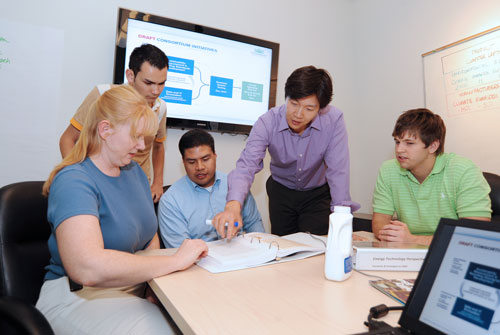 TEMPE, Ariz. – August 15, 2013 – Recognizing a gap in sustainability leadership education and development, Arizona State University, the nation’s leader in sustainability education, is launching a new executive master’s program focusing on organizational leadership. This new program will equip professionals with the skills to effectively integrate sustainability throughout all facets of their organizations.
TEMPE, Ariz. – August 15, 2013 – Recognizing a gap in sustainability leadership education and development, Arizona State University, the nation’s leader in sustainability education, is launching a new executive master’s program focusing on organizational leadership. This new program will equip professionals with the skills to effectively integrate sustainability throughout all facets of their organizations.
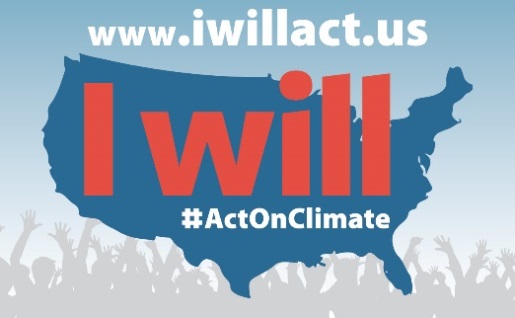 PHOENIX, Ariz. – July 31, 2013 – Local elected officials, business owners and advocates held a press conference today to highlight the impacts of climate change – including extreme heat, drought and air and water quality – on Arizona’s environment, economy and public health.
PHOENIX, Ariz. – July 31, 2013 – Local elected officials, business owners and advocates held a press conference today to highlight the impacts of climate change – including extreme heat, drought and air and water quality – on Arizona’s environment, economy and public health.
 OAKLAND, Calif. and PHOENIX, Ariz. – June 12, 2013 – GreenBiz Group, The Sustainability Consortium, and the Rob and Melani Walton Sustainability Solutions Initiatives, a program of the Global Institute of Sustainability at Arizona State University, will be coming together for the Sustainability Solutions Festival, a unique and powerful partnership among three leadership institutions.
OAKLAND, Calif. and PHOENIX, Ariz. – June 12, 2013 – GreenBiz Group, The Sustainability Consortium, and the Rob and Melani Walton Sustainability Solutions Initiatives, a program of the Global Institute of Sustainability at Arizona State University, will be coming together for the Sustainability Solutions Festival, a unique and powerful partnership among three leadership institutions.
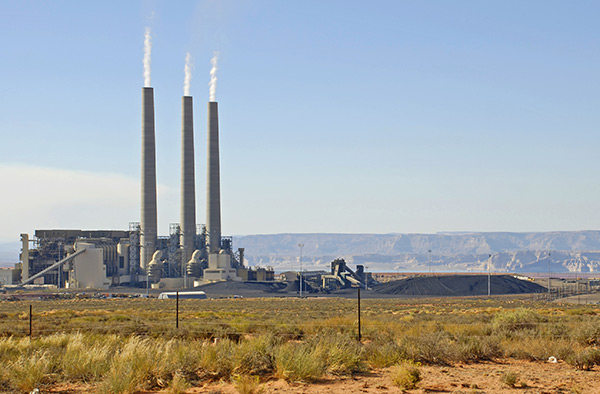 TEMPE, Ariz. – April 24, 2013 – According to the Environmental Protection Agency (EPA), the largest coal-fired power plant in the west needs to improve its pollution controls.
TEMPE, Ariz. – April 24, 2013 – According to the Environmental Protection Agency (EPA), the largest coal-fired power plant in the west needs to improve its pollution controls.

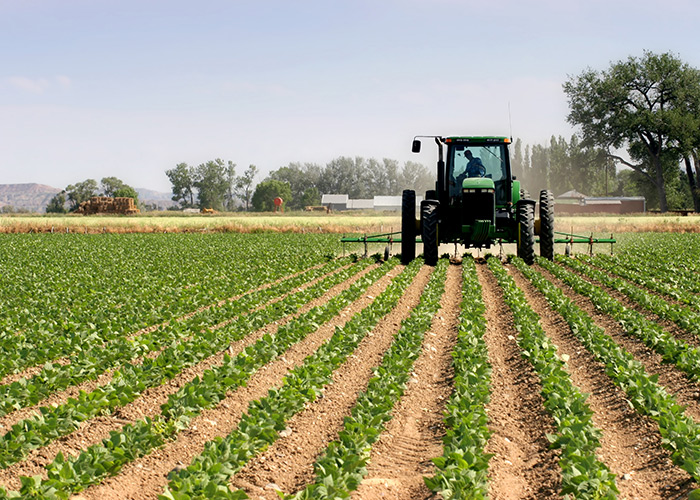 TEMPE, Ariz. — April 18, 2013 — The
TEMPE, Ariz. — April 18, 2013 — The 





 TEMPE, Ariz. - January 22, 2013 - Arizona State University’s (ASU) Global Institute of Sustainability (GIOS) and the
TEMPE, Ariz. - January 22, 2013 - Arizona State University’s (ASU) Global Institute of Sustainability (GIOS) and the